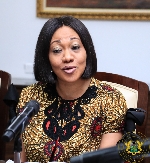MoMo tax 'not well-thought-through; withdraw, fine-tune, relaunch' – Ali-Nakyea
 Dr Abdallah Ali-Nakyea
Dr Abdallah Ali-Nakyea
The recently introduced 1.75% E-Levy by the government in the 2022 budget was not well-thought-out, tax analyst Abdallah Ali-Nakyea has observed.
In his view, it must be withdrawn, fine-tuned and relaunched just as was done to the Value Added Tax (VAT) when it was met with a lot of opposition upon introduction for the first time.
“Tax policymaking is a process and not an event”, Dr Ali-Nakyea noted in an interview on Monday, 22 November 2021, noting: “So, when you come out with such a policy, on the face of it is stated that there will be a 1.75% e-levy on the value; that is the simple interpretation anyone will give.”
“There are so many reactions to this that tell me that this is not a policy that has been well-thought-through”, said Dr Ali-Nakyea.
He pointed out that “it is not new in the sense that two years ago, it started popping up” when the Communication Ministry “began giving signals that we want to look at that sector”.
“I thought that we should be having a stakeholder engagement and consultation by now and then we can fine-tune it”, he said.
“Just as was done with VAT; it was withdrawn after the ‘Kumi preko’ demonstration, a stakeholder consultation was held after which it was relaunched. That is exactly what I think should be done in this case”, he proposed.
“I think it should be withdrawn, deliberated on, and relaunched”, he insisted in an interview on Accra-based Citi FM on Monday, 22 November 2021.
“Can we take our time to determine who is to pay the tax? Which transactions should be covered? How we are going to collect it and account for it? After that, we need to audit to ensure that all that has to be collected has been done. How do we go through all these? This is what a tax policy project entails. Then we will all be certain.”
Once the 2022 budget is approved, all electronic transactions in Ghana will attract the E-Levy, as part of moves by the government to shore up its kitty.
It takes effect from February 2022.
In justifying the imposition of the new levy, Finance Minister Ken Ofori-Atta explained that the upsurge in the use of e-payment platforms as a result of the COVID-19 pandemic has been an impetus.
As a result, Ghana recorded a total of GHS500 billion from e-transactions in 2020 compared with GHS78 billion in 2016.
He said: “It is becoming clear there exists an enormous potential to increase tax revenues by bringing into the tax bracket, transactions that could be best defined as being undertaken in the informal economy.”
He noted, therefore, that the government is charging an applicable rate of 1.75% on all electronic transactions covering mobile money payments, bank transfers, merchant payments and inward remittances, which shall be borne by the sender except inward remittances, which will be borne by the recipient.
“Mr Speaker, to safeguard efforts being made to enhance financial inclusion and protect the vulnerable, all transactions that add up to GHS100 or less per day, which is approximately GHS3,000 per month, will be exempt from this levy,” he stated.
He said E-Levy proceeds will be used to support entrepreneurship, youth employment, cyber security, and digital and road infrastructure, among others.
“Mr Speaker, this new policy also comes into effect once appropriation is passed from 1st January 2022. The government will work with all industry partners to ensure that their systems and payment platforms are configured to implement the policy,” he said.
Source: classfmonline.com
Trending News

Ejisu: CPP seeks injunction to stop April 30 By-election
08:33
Adu-Ampomah & Amoah know Lithovit is liquid fertiliser – COCOBOD RM&E Dir. tells court
10:26
Akatakyie AX group celebrates 72nd anniversary of Opoku Ware School with project
10:32
NDC to outdoor Prof Naana Opoku-Agyemang as running mate today
08:29
IMF: Failure to agree Eurobond deal 'won't stop us from providing more financing to Ghana'
08:41
Petrol bomb attack on CMG shocking; we’ve not seen this type before’ – GIBA
10:00
Submit 2023 audited financial statements by May – Akufo-Addo orders SOEs
07:48
Growth to rise from 3.4% to 3.8% for Sub-Saharan Africa
08:22
Minister urges Presby Church to invest in youth businesses at 37th Presbytery Session
09:06
Dismiss ECG, GWCL, GACL bosses over losses – United Voices for Change to gov’t
07:38



